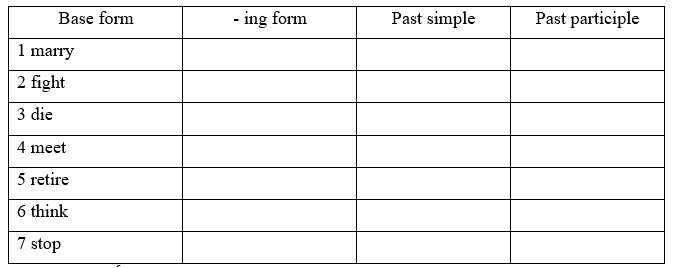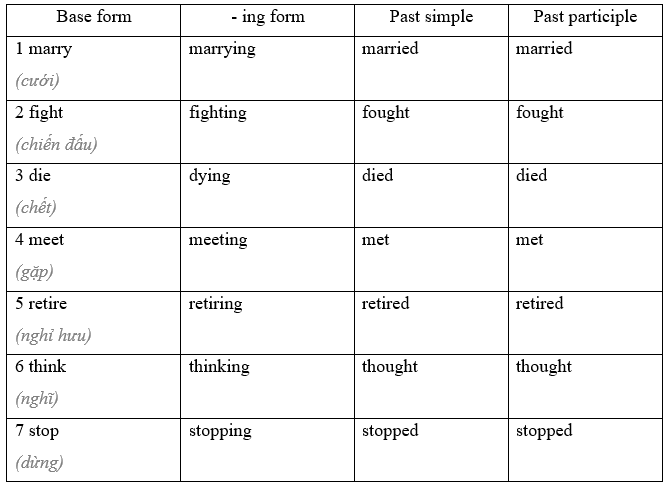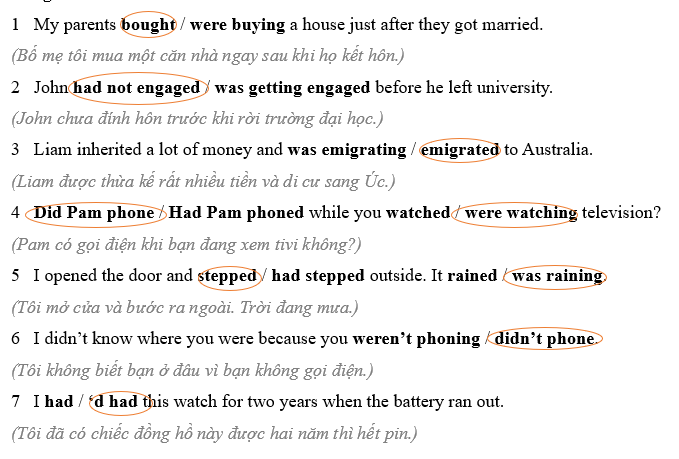1B. Grammar - Unit 1. Generations - SBT Tiếng Anh 11 Friends Global
1. Complete the table with the -ing form, past simple and past participle form of the verbs. 2. Circle the correct answers. 3. Some of the verb forms and tenses in the sentences are incorrect. Rewrite them correctly. Tick the correct sentences.
Bài 1
Past tense contrast
I can talk about the past using a variety of past tenses.
1. Complete the table with the -ing form, past simple and past participle form of the verbs.
(Hoàn thành bảng với dạng -ing, quá khứ đơn và quá khứ phân từ của động từ.)

Lời giải chi tiết:

Bài 2
2. Circle the correct answers.
(Hãy khoanh tròn những câu trả lời đúng.)
1 My parents bought / were buying a house just after they got married.
2 John had not engaged / was getting engaged before he left university.
3 Liam inherited a lot of money and was emigrating / emigrated to Australia.
4 Did Pam phone / Had Pam phoned while you watched / were watching television?
5 I opened the door and stepped / had stepped outside. It rained / was raining.
6 I didn’t know where you were because you weren’t phoning / didn’t phone.
7 I had / ‘d had this watch for two years when the battery ran out.
Lời giải chi tiết:

Bài 3
3. Some of the verb forms and tenses in the sentences are incorrect. Rewrite them correctly. Tick the correct sentences.
(Một số dạng động từ và thì trong câu không chính xác. Viết lại chúng một cách chính xác. Đánh dấu vào câu đúng.)
1 Why did you be angry with Mary? ☐
_________________________________
2 Had you eaten before you went out? ☐
_________________________________
3 I couldn’t go out until I had did my homework. ☐
_________________________________
4 It wasn’t rain when we left the house. ☐
_________________________________
5 I wasn’t feeling well this morning. ☐
_________________________________
Lời giải chi tiết:
1 Why did you be angry with Mary? ☐
=> Why did you get angry with Mary?
(Tại sao bạn lại tức giận với Mary?)
2 Had you eaten before you went out? ☑
(Bạn đã ăn gì trước khi ra ngoài chưa?)
3 I couldn’t go out until I had did my homework. ☐
=> I couldn’t go out until I had done my homework.
(Tôi không thể ra ngoài cho đến khi tôi làm xong bài tập về nhà.)
4 It wasn’t rain when we left the house. ☐
=> It wasn’t raining when we left the house.
(Trời đang không mưa khi chúng tôi rời khỏi nhà.)
5 I wasn’t feeling well this morning. ☑
(Sáng nay tôi cảm thấy không được khỏe.)
Bài 4
4. Write the negative and interrogative form of the sentences.
(Viết dạng phủ định và nghi vấn của câu.)
1 Jason had been to Italy.
(Jason đã đến Ý.)
Jason hadn’t been to Italy.
(Jason chưa từng đến Ý.)
Had Jason been to Italy?
(Jason đã đến Ý chưa?)
2 Tom grew up in London.
_______________________________
_______________________________
3 Her parents split up last year.
_______________________________
_______________________________
4 Harry was living in Scotland.
_______________________________
_______________________________
Phương pháp giải:
*Thì quá khứ đơn:
- Câu phủ định: S + didn’t + Vo (nguyên thể).
- Câu hỏi: Did + S + Vo (nguyên thể).
*Thì quá khứ tiếp diễn:
- Câu phủ định: S + was / were + V-ing
- Câu hỏi: Was / Were + S + V-ing?
Lời giải chi tiết:
2 Tom grew up in London.
(Tom lớn lên ở Luân Đôn.)
Tom didn’t grow up in London.
(Tom không lớn lên ở London.)
Did Tom grow up in London?
(Tom có lớn lên ở London không?)
3 Her parents split up last year.
(Cha mẹ cô chia tay vào năm ngoái.)
Her parents didn’t split up last year.
(Cha mẹ cô ấy đã không chia tay vào năm ngoái.)
Did her parents split up last year?
(Cha mẹ cô ấy đã chia tay vào năm ngoái phải không?)
4 Harry was living in Scotland.
(Harry đang sống ở Scotland.)
Harry wasn’t living in Scotland.
(Harry không sống ở Scotland.)
Was Harry living in Scotland?
(Harry có sống ở Scotland không?)
Bài 5
5. Complete the sentences with the verbs below. Use the past simple, past continuous or past perfect.
(Hoàn thành câu với các động từ dưới đây. Sử dụng thì quá khứ đơn, quá khứ tiếp diễn hoặc quá khứ hoàn thành.)

1 I couldn’t pay for the pizzas because I ____________ my money at home.
2 I put on my coat and ____________
3 You didn’t understand the question because you ____________
4 When we woke up, everything was white because it ____________ during the night.
Phương pháp giải:
*Nghĩa của từ vựng
go out (phr.v): đi ra ngoài
leave (v): rời đi
not listen (v): nghe
snow (v): có tuyết rơi
Lời giải chi tiết:

1 I couldn’t pay for the pizzas because I had left my money at home.
(Tôi không thể trả tiền pizza vì tôi để quên tiền ở nhà.)
2 I put on my coat and went out.
(Tôi mặc áo khoác và đi ra ngoài.)
3 You didn’t understand the question because you weren’t listening.
(Bạn không hiểu câu hỏi vì bạn đang không lắng nghe.)
4 When we woke up, everything was white because it had snowed during the night.
(Khi chúng tôi thức dậy, mọi thứ đều trắng xóa vì tuyết đã rơi suốt đêm.)
Bài 6
6. Complete the text with the verbs in brackets. Use the past simple, past continuous or past perfect.
(Hoàn thành đoạn văn với động từ trong ngoặc. Sử dụng thì quá khứ đơn, quá khứ tiếp diễn hoặc quá khứ hoàn thành.)
When Sarah Knauss 1____________ (die) on 30 December 1999, she 2____________ (live) in Pennsylvania, USA, where she 3____________ (spend) all her life. At the time of her death, only one person before her 4____________ (live) longer. Sarah 5____________ (have) one daughter, who 6____________ still ____________ (live) when Sarah died.
Lời giải chi tiết:

Bài hoàn chỉnh
When Sarah Knauss died on 30 December 1999, she was living in Pennsylvania, USA, where she had spent all her life. At the time of her death, only one person before her had lived longer. Sarah had one daughter, who was still livving when Sarah died.
Tạm dịch
Khi Sarah Knauss qua đời vào ngày 30 tháng 12 năm 1999, bà đang sống ở Pennsylvania, Hoa Kỳ, nơi bà đã sống cả cuộc đời. Vào thời điểm cô qua đời, chỉ có một người trước cô sống lâu hơn. Sarah có một cô con gái vẫn còn sống khi Sarah qua đời.
Search google: "từ khóa + timdapan.com" Ví dụ: "1B. Grammar - Unit 1. Generations - SBT Tiếng Anh 11 Friends Global timdapan.com"







